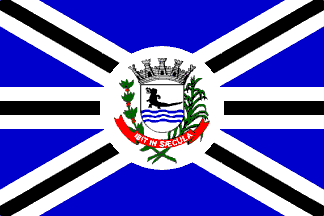
This page is part of © FOTW Flags Of The World website
Jacarezinho, Paraná (Brazil)
Last modified: 2002-11-02 by joe mcmillan
Keywords: brazil | parana | jacarezinho | caiman | coat of arms | crocodile |
Links: FOTW homepage |
search |
disclaimer and copyright |
write us |
mirrors
See also:
About the Flag of Jacarezinho
The symbols of Jacarezinho were established by laws no. 167 of 18 December
1953 and no. 505 of 19 June 1969. The flag is blue, divided into six parts
by six white stripes surcharged with black stripes, with the coat of arms in
the center on a white circle. It is described (inaccurately) as conforming
to Portuguese traditions for municipal flags. The design follows the
standard interpretation in which the coat of arms represents the municipal
government, the circle the city in which it has its seat, the stripes the
radiation of municipal power, and the segments of the field the rural areas
of the municipality. According to
www.fabiojuniorsoares.hpg.ig.com.br/simbolos1.htm, the then-president of the municipal council
(apparently in 1969) requested the assistance of Arcinóe Antônio Peixoto de
Faria to "correct" and prepare an illustration of the coat of arms that had
been adopted in 1953 and to design the flag of Jacarezinho. The coat of
arms is described as being on a Flemish-Iberian shield ensigned with a
silver mural crown of eight towers. On a white field is a black stylized
caiman rampant above three blue bars wavy. The shield is flanked by
branches of coffee and sugar cane; the scroll is inscribed with the motto
Ibit in sæcula (It will pass to posterity). Apart from the usual color
symbolism that Peixoto attributes to all his designs, this is a canting coat of arms, since the
Portuguese word for caiman is jacaré. Jacarezinho would mean "little
caiman." The three bars wavy symbolize the three main rivers of the municipality,
the Jacaré, the Paranapanema, and the Prata.
Joseph McMillan, 11 July 2002
